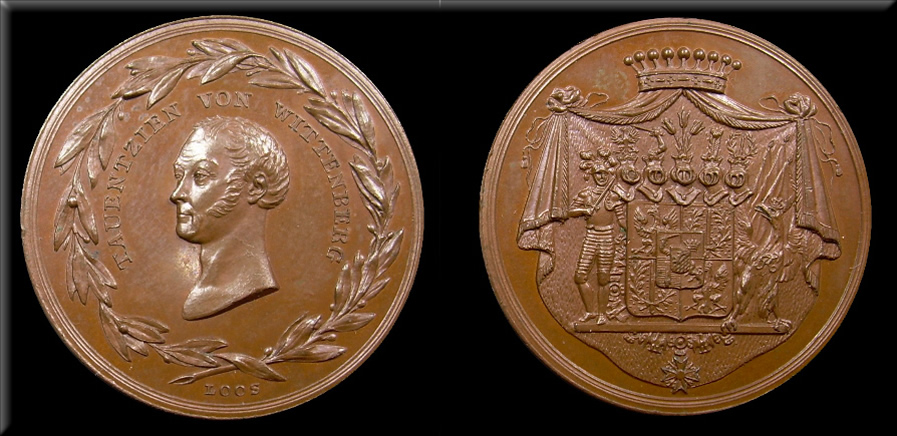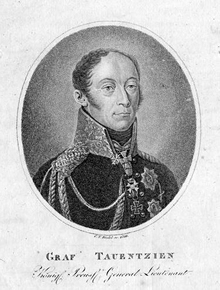Born: Potsdam, 15 September 1760
Died: Berlin, 20 February 1824
Prussian general
Joining the Prussian army in 1775, Tauentzien became royal Flügeladjutant 16 February 1793 serving the king directly (he had become Graf von Wittenberg in 1791 and received the "pour le mérite" medal in December 1792). He was also advantageously married when young to a sister of Haugwitz's brother-in-law. He was also a close relation of General Field Marshal General von Knesebeck. He was also remarkably intelligent and handsome, all of which greatly enhanced the smoothness of his rise. From the time of his promotion to Flügeladjutant until 1813 he was to be entrusted with many diplomatic missions. He was Prussian diplomatic representative both in the Low Countries (1794) and subsquently extraordinary envoy and plenipotentiary in Russia. He took part in the campaign of 1793, being promoted to Oberst in 1795 and Generalmajor in 1801. In 1804 he commanded infantry regiment no 56. He was also the commander of Prussian troops in Ansbach when Bernadotte passed through with his troops in the autumn of 1805. In 1806, he was appointed commander of the observation corps sent by Prince von Hohenlohe to Saalberg. Marshal Soult drove him back at Schleiz on 9th October, but he still managed to bring his troops back to the main army, despite the defeat.
At Jena, Tauentzien was in charge of the avant garde of the Hohenlohe's corps and, stationed at Dornberg, Closewitz and Lützeroda, received the brunt of the French attack. His defeated troops retired to Krippendorf. he was to be imprisoned on 23 December, 1806, in the castle at Bitsch, only to be released in April 1807 in exchange for a French general. After the peace at Tilsit he was appointed Generalleutnant of the Kommando of the Brandenburgischen Brigade and later oversaw the reorganisation of the Prussian army. After the catastrophe of 1806, 141 Prussian generals were dismissed - only Tauentzien and Blücher were to remain.
In 1813 Tauentzien was appointed Military Governor for the area between the Oder and the Weichsel, at which time and he led the siege of Stettin. In August he became commander of the infantry, most of which came from men remaining in the IVth Prussian army corps, leading them both at Grossbeeren (23 August) and Dennwitz (6 September). In October his corps was left behind to cover the crossing of the Elbe at Dessau. After the battle of Leipzig he forced the capitulation of Torgau (26 December). He is said to have stormed and taken Wittenberg during the night of 13 to 14 January 1814, hence the honorific title “von Wittenberg”, a coat of arms and (on 26 January 1814) the Großkreuz of the order of the Iron Cross for his military achievements. But it is now known that Wittenberg was taken by Lieutenant General Leopold Wilhelm von Dobschütz, but that Tauentzien received the title because of his high rank. Dobschütz was however subsequently made governor of Dresden. Tauentzien also took Magdeburg, 24 May 1814, after blockading it. In the campaign of the following year Tauentzien was put in command of the VIth army corps. However, Waterloo took place before he could see action. After the peace Tauentzien was given supreme command over the IIIrd corps. He died as Commander of Berlin on 20 February 1824.
(from Napoleon.org) |

